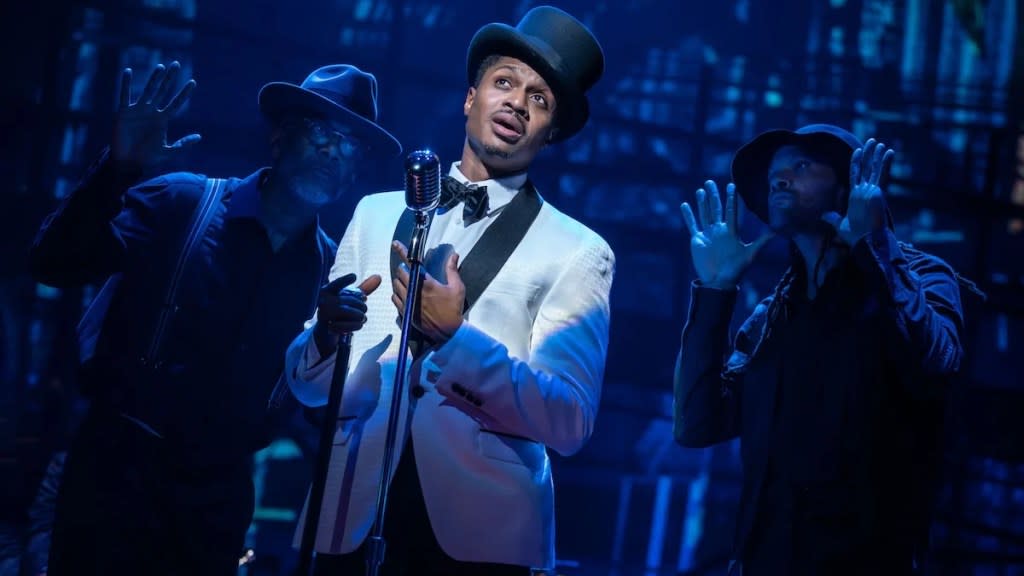‘Pal Joey’ Off Broadway Review: Bewitched, Bothered and Completely Misbegotten

- Oops!Something went wrong.Please try again later.
- Oops!Something went wrong.Please try again later.
- Oops!Something went wrong.Please try again later.
“Pal Joey” is now a Rodgers and Hart jukebox musical. In their radical overhaul of the 1940 Broadway production that made Gene Kelly a star, book writers Richard LaGravenese and Daniel “Koa” Beaty have dumped a half dozen songs (from “Love Is My Friend” to “Take Him”) that were heard in the original and substituted many more from the Rodgers and Hart trunk.
The bigger change, however, has to do with the title character, who now has a purpose in life beyond money. Joey is a Black musician who wants to sing “our sound,” which — he tells us incessantly — is “new.” Apparently, someone forgot to tell the new Joey that he is still singing old songs written by Richard Rodgers and Lorenz Hart, music that came not out of the jazz tradition but Italian verismo opera. As rewritten musicals go, the mess that Aaron Sorkin made out of last season’s “Camelot” looks downright inspired compared to the misbegotten “Pal Joey” that Gala opened Wednesday at New York’s City Center.
LaGravenese and Beaty have left John O’Hara’s basic story intact: Joey Evans (Ephraim Sykes) momentarily achieves his dream of operating a nightclub called Chez Joey, paid for by rich lady friend Vera (Elizabeth Stanley). That becomes possible only after he dumps girlfriend Linda (Aisha Jackson). The new Joey, however, is no ordinary cad. He is also an artist, a jazz musician who is tired of white men like Bing Crosby, Paul Whiteman and Benny Goodman ripping off Black music.
Odd, isn’t it, that Rodgers and Hart never wrote a song about cultural appropriation. Nor did they write a song about how a wealthy white woman (Vera) has the hots for a young Black man (Joey).
Since the legendary songwriting team never wrote about these things, LaGravenese and Beaty must. They do so in excruciating detail, piling up the show with more motivation than it took Sorkin to turn Guinevere into an oppressed but liberated woman plotting for her freedom.
When Stanley’s Vera sings “Bewitched, Bothered and Bewildered” after having great sex with Joey, it recalls that moment in “Young Frankenstein” when Madeline Kahn gets laid by Peter Boyle’s Monster and breaks into “Ah, Sweet Mystery of Life!”
If ever a character in a musical should sue, it is Vera. She’s now a shrew, a racist and an arsonist. At the end, when “Bewitched” is reprised, it is Joey — not Vera — who should be relieved and singing the words, “no more.”
The new “Pal Joey” book takes one cue from the dreadful 1957 movie version starring Frank Sinatra. It comes when Joey sings “The Lady Is a Tramp” (not written for the 1940 musical) to seduce his future patroness. Add masochist to Vera’s list of debilitating character flaws.
Since the musical is now set in not only a nightclub but a recording studio and a radio sound booth, Rodgers and Hart standards like “My Funny Valentine” and “Where or When” are dropped in willy-nilly. Most curious is how Joey sings “Blue Moon” to open his new nightclub, but becomes overwhelmed by guilt for having sold out his people’s “sound,” so he breaks into a syncopated “Lover.” Why the one Rodgers and Hart song is a sellout and the other is the epitome of being a committed jazz musician is not explained.
The female reporter who sings the comic “Zips” has been turned into a male reporter, played by Brooks Ashmanskas, who takes off his jacket, drops his suspenders and loosens his tie. The casting stunt would be funny if the setup weren’t to expose the character as a racist.
Sykes, to his credit, doesn’t ask for our sympathy the way his dialogue begs for it. In a normal “Pal Joey,” he would be a great Joey. He exudes confidence without ever pushing it, and especially affecting is the understated way he unveils a song like “I Could Write a Book.” He leaves the over-emotive deliveries to his two leading ladies.
Tony Goldwyn and Savion Glover direct, and Glover also choreographs. Tap-dancing spirits (called “griots” in the credits) follow Sykes around the stage. They don’t provide segues between scenes so much as they remind us that several elements of this production, including these dancers, have absolutely nothing to do with what Rodgers and Hart — not to mention O’Hara — wrote.
The post ‘Pal Joey’ Off Broadway Review: Bewitched, Bothered and Completely Misbegotten appeared first on TheWrap.

